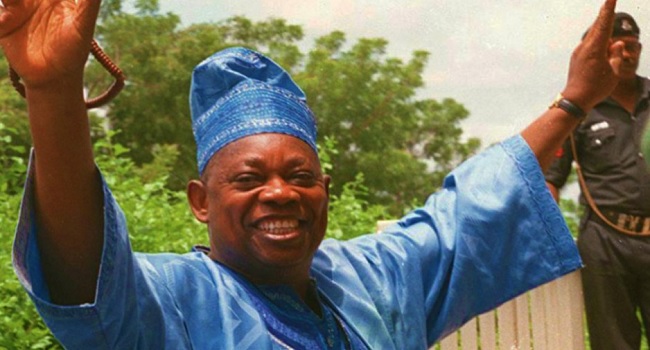Thirty-two years after his controversial annulment of the June 12, 1993, presidential election, Nigeria’s former Head of State, Ibrahim Babangida, admitted for the first time that the late philanthropist and democracy hero Moshood Kashimawo Olawale (MKO) Abiola won the election.
A Journey in Service: An Autobiography of Ibrahim Babangida, a 420-page memoir titled “A Journey in Service: An Autobiography of Ibrahim Babangida,” which was released in Abuja on Thursday with national and international dignitaries in attendance, revealed the shocking revelation.

The book reviewer, former Vice President Yemi Osinbajo, said the “evil genius” and “Maradona” as Babangida was nicknamed answered the question as to whether Abiola won the June 12 election or not in his book.
There is no doubt that MKO Abiola won the June 12 elections, Babangida admitted in his book, even though I am on record to have stated after the election that I may not have won the election after further reflection and a thorough examination of all available information, particularly the detailed election results, which are published as an appendix to this book.
It was obvious that, having received 8, 128, 720 votes in opposition to Tofa’s 5, 848, 247 votes and obtaining the required of one-third of the votes cast in 28 states of the Federation, including Abuja, was the candidate who had won the presidential election.
READ ALSO: Abacha Wouldn’t Have Taken Over If I Was Allowed To Resume As Sonekan’s ADC – Bello-Fadile
During his address, Babangida, famously known as IBB, told the gathering that the annulment of the poll was in “extreme national interest”.
“I owe complete accountability for all decisions I make as the head of the military administration.” And June 12 happened under my watch. Mistakes, oversights, and missteps happen in quick succession but I say in my book, in all matters, we acted in extreme national interest so that Nigeria could survive”, he said.
Former President Olusegun Obasanjo’s admission that Babangida had admitted to being a bad person had given credence to his earlier assertion that if not for “bad belle” – Nigerian colloquial for bad blood, MKO Abiola would have been elected president after the June 12, 1993 presidential election.

Long Walk To Fourth Republic
The return of democracy in Nigeria in 1999 followed a series of events, some bloody and undesirable. The 1993 presidential election and the coup against General Muhammadu Buhari, the coup against Babangida, who seized power in 1985 in a coup against him, paved the way for civil society. In the wake of the protests and unrest that followed, he would later resign and cancel the election.
With businessman Ernest Sonekan serving as president and Sani Abacha as the chief of the defense staff and defense minister, Babangida established an interim government. On November 18, 1993, three months into his administration, Abacha overthrew Sonekan in a palace coup.
Protests and unrest erupted all over the country after the Social Democratic Party’s (SDP) candidate’s primary opponent, Bashir Tofa of the National Republican Convention, was canceled on June 12, 1993.
Abiola declared himself president after being bolstered by uncontestable evidence of his electoral victory. He was denied his mandate, and Sani Abacha, Babangida’s chief of defense staff, Sani Abacha, the military regime, put him in jail as a result.
On July 7, 1998, the political colossus passed away in a troubling and eminently suspect detention setting. He was 60 years old. One of his wives, Kudirat, was viciously assassinated on June 4, 1996.

General Abdulsalami Abubakar assumed control of the country after Abacha’s passing, leading to the transition to democratic rule with former head of state Obasanjo winning the election on the Peoples Democratic Party’s (PDP) platform, enlarging the Fourth Republic. Before becoming the nation’s democratically elected President between 1999 and 2007, Obasanjo served as the country’s first military head of state between February 1976 and October 1979.

Has Justice Been Served?
The pro-democracy movement NADECO and the regional socio-political group Afenifere have been clamoring for years for a solution to the “injustice” done to the Abiolas and Yoruba people of Nigeria’s South-West region in terms of whether the poll’s credibility or otherwise has been at the forefront of political debates.
In honor of Abiola, President Muhammadu Buhari moved Democracy Day from May 29 to June 12 in order to provide some relief or compensation for the country’s history and to remind everyone of one of the country’s most free elections in history. The Fourth Republic’s ideals were first reaffirmed 25 years ago in the day to honor them.
Babangida, in his memoir, said he was gratified that Buhari recognised Abiola as a former head of state.
The June 12 saga is undeniably the most difficult time in my life and, in some ways, one of the most agonizing. If I had to do it all over again, I would do it differently”, he stated.
Former presidents and heads of state Olusegun Obasanjo, Goodluck Jonathan, Yakubu Gowon, and Abdulsalami Abubakar, as well as former vice presidents Atiku Abubakar and Namadi Sambo, were among the most decorated men present for the book launch.
Both Kashim Shettima and President Bola Tinubu were present. Billionaire businesspersons including Aliko Dangote, Abdulsamad Rabiu, and Folorunsho Alakija, among others, were not left out of the roll call of the who’s who.
Source: Channels TV





Leave a Reply